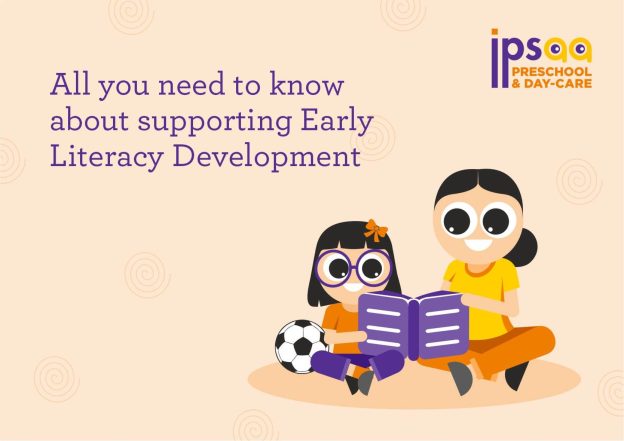At a pivotal time in the development of a child, the most important thing you can do to support their early literacy development is to provide them with a stable, enthusiastic, and well-structured relationship they need.
While it is important to provide your child with a stable and supportive home environment, it is also essential to create opportunities for them to interact with other children and adults. This can be done through involvement in quality early childhood programs, such as play schools.
What is Early Literacy?
Early literacy is the skills and knowledge related to reading and writing. It includes the ability to understand and use spoken language, to recognize and read words, and begin to write. Early literacy develops as children are exposed to books, magazines, newspapers, labels, signs, and other print material in their homes and communities.
Most experts agree that early literacy begins to develop in the earliest years of life, long before a child even enters play schools. In fact, many important pre-reading and pre-writing skills are acquired during the first three years of life. Although some children may begin to read and write at an earlier age, most do not start reading and writing on a regular basis until they are five or six years old.
Early literacy is an important predictor of later success in school and in life. Children who have strong early literacy skills are more likely to do well in school and to continue learning throughout their lives.
Importance of Early Literacy Development
One of the most important things that parents can do to support their child’s education is to help them develop strong early literacy skills. Research has shown that children who have strong early literacy skills are more likely to be successful in school and in life.
There are many ways that parents can support their child’s early literacy development. One way is by reading aloud to them on a daily basis. This helps them to develop a love for reading and also exposes them to a wide variety of words and concepts. It’s also important for parents to talk to their children about what they’re reading. Asking questions and encouraging conversation will help your child to understand better what they’re reading and to make connections between the text and the world around them.
In addition to reading out loud and talking about books, there are many other ways that parents can support their child’s early literacy development. These include singing songs, playing games, taking help from play school, and writing together. By taking an active role in your child’s early literacy development, you can help set them up for success in school and in life.
How to Support Early Literacy Development
There are many ways to support early literacy development at home. Below are some tips:
- Read aloud to your child every day. This helps develop vocabulary, listening skills, and an appreciation for stories.
- Talk to your child often. Describe what you’re doing, ask questions, and tell stories. This helps develop language skills.
- Encourage your child to use books and other materials that are age-appropriate and of interest. This helps develop a love for learning and motivation to read.
- Provide opportunities to your child to write, such as by using a drawing pad or writing letters and words in sand or shaving cream. This strengthens fine motor skills and develops a foundation for writing skills.
- Help your child sound out words when reading together. This supports phonetic awareness, an important building block for reading success.
Role of Families
Families play an important role in supporting early literacy development. By reading together, talking about books, and singing songs, parents can help their children develop the skills they need to be successful readers.
The benefits of reading with young children are many. It helps them develop language skills, they learn to follow directions and build an attention span. Reading also fosters imagination and creativity and helps children understand the world around them. In addition, research has shown that families who read together have closer relationships and better communication.
Encouraging a love for reading at an early age will help children develop a strong foundation for later success in school and in life.
Meeting Budding Readers at Their Eye Level
When parents and caregivers think about supporting their child’s early literacy development, they often focus on reading aloud together. While reading aloud is certainly important, it’s just one part of the puzzle. Another equally important piece is providing opportunities for your child to see words and print in their environment.
One way to do this is by placing interesting books and magazines at your child’s eye level. This will encourage them to take a look at the pictures and maybe even try to read some of the words. You can also point out at the print when you’re out and about, such as street signs or labels on products. Also, if you’re a working parent, using help of play schools or daycare are an excellent way to develop early literacy in your child.
When you take the time to meet your budding reader at their eye level, you’re helping them develop a key foundation for literacy success!
Making Connections Through Stories
Storytelling is a time-honored tradition that has been passed down through the generations. It is a way to connect with others and share our experiences. When we tell stories, we are able to see the world from another person’s perspective. This can help us to understand and empathise with others.
Storytelling can also be a powerful tool for teaching. When we share stories with children, we can help them make connections between the characters and events in the story and their own lives. This can help them to understand complex concepts and develop empathy for others.
There are many ways to incorporate storytelling into your child’s life. You can read stories together, act out stories, or even create your own stories. No matter how you do it, storytelling is a great way to support your child’s early literacy development.
Conclusion
The policy suggestions made in this brief are based on fundamental knowledge and research on early literacy. The development of literacy begins early in life and is closely related to academic success. Each area of a child’s development, including literacy, is interconnected and dependent on the others. A child who is more likely to have trouble learning to read, the more limited their exposure to language and literacy has been. Therefore, it is necessary to take assistance of professionals at play schools such as ipsaa, which helps in the overall development of your child. https://ipsaa.in/


